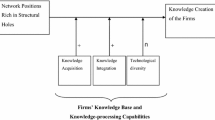Abstract
Intangible resources are the source of competitive advantage in theknowledge economy. Knowledge and intellectual capital within firms havegathered worldwide attention; theories and methods for knowledgecreation management have been developed for organizations and alliances.Economic reality shows the importance of industrial districts becausesocial systems in districts provide dynamic contexts of multifacetedrelationships. These dynamic contexts or district ba (Japanesefor place) enable firms to create and harness knowledge that resides innetwork relationships.
The paper develops a theoretical frame of four kinds of district ba thatsupport four knowledge processes. Organizational networks within andbetween different district ba are conceptualized. The creationof knowledge within district ba is used to analyze differentlevels of interaction between firms in the same or different districtsand in the same or different industries. The case study of the JETROlocal-to-local program between Ishikawa prefecture in Japan and Como andVarese in Italy is used to illustrate the theoretical concepts. Districtba are used to analyze the knowledge creation dynamics withinand between districts and to identify possible strategies for districtgovernance.
Similar content being viewed by others
References
Aggarwal, N.: 1998, “Manufacturing, Services to be the 'Twin Engines of Growth' - Eight Strategies for Singapore”, The Sunday Times, March 8, p. 27.
Becattini, G.: 1987, “Sector and/or Districts: Some Remarks on the Conceptual Foundations of Industrial Economics”, in Goodman and J. Bamford (eds.), Small Firms and Industrial Districts in Italy(New York: Routledge), pp. 123–135.
Becattini, G.: 1987, “Il distretto industriale marshalliano: cronaca di un ritrovamento”, in G. Beccattini (ed.), Mercato e forze locali: il distretto industriale, Il (Mulino: Bologna), pp. 7–34.
Best, M.: 1990, The New Competition: Institutions of Industrial Restructuring(Cambridge: Harvard University Press).
Booz Allen and Hamilton: 1997, Vision Korea - Revitalizing the Korean Economy toward the 21st Century(Seoul: Korea Development Institute).
Bursi, T., G. Marghi and G. Nardin: 1997, “Trasformazioni organizzative nell'impresa distrettuale: alcune premesse sulla definizione dell'unita di analisi”, in R. Varaldo and L. Ferrucci (eds.), Il distretto industriale tra logiche di impresa e logiche di sistema(Franco Angeli: Milano), pp. 107–148.
Cluster Conocimiento: 1998, “The Strategic Management: Knowledge as a Regional System - the Case of the Basque Country”, Strategic Management Society Annual Conference(Orlando).
Corno, F.: 1998, “Value Creation Within Districts”, paper presented at Value Creation Within Districts in a Global Perspective, conference at LIUC, Castellanza, July.
Corno, F.: 1989, Sapere imprenditoriale e governo dell'impresa(Egea: Milano).
Corno, F.: 1997, Patrimonio Intangibile e governo dell'impresa(Egea, Milano).
Dei Ottati, G.: 1991, “The Economic Bases of Diffused Industrialization”, International Studies of Management and Organization21(1): 53–74.
Ishikawa Prefecture Government: 1999, Industries of Ishikawa Prefecture(Kanazawa) (in Japanese).
Ishikawa Prefecture Government: 1997, Industry and Commerce Outline(Kanazawa).
Larson, A.: 1992, “Network Dyads in Entrepreneurial Settings: A Study of the Governance of Exchange Relationships”, Administrative Science Quarterly(37): 76–104.
Lazerson, M.H. and G. Lorenzoni: 1998, The Firms that Feed Industrial Districts: A Return to the Italian Source, unpublished.
Lipparini, A.: 1998, “Assetti relazionali per lo sviluppo e l'integrazione delle competenze”, in A. Lipparini (ed.), Le competenze organizzative(Roma: Carocci), pp. 225–245.
Lorenz, E.: 1998, “Neither Friends nor Strangers”, in D. Gambetta (ed.), Trust: Making and Breaking Cooperative Relations(Oxford: Blackwell), pp. 194–210.
Lorenzoni, G.: 1997, “Imprese, relazioni tra imprese, distretti industriali nello sviluppo delle P.M.I.”, in R. Varaldo and L. Ferrucci (eds.), Il distretto industriale tra logiche di impresa e logiche di sistema(Franco Angeli: Milano).
Ministry of Economic Affairs: 1998, Kennis in Beweging(Sdu: The Hague).
Nonaka, I. and H. Takeuchi: 1995, The Knowledge Creating Company(New York: Oxford University Press).
Nonaka, I. and N. Konno: 1998, “The Concept of Ba: Building a Foundation for Knowledtge Creation”, California Management Review(Spring) 40(3): 40–47.
Nonaka, I. and P. Reinmoeller: 1998, “Legacy of Learning”, WZB Yearbook(Berlin: Sigma), pp. 401–432.
Nonaka, I., P. Reinmoeller and T. Shibata: 1998, “Knowledge and Regions”, Office Automation19(4): 3–13(in Japanese).
Nonaka, I., P. Reimoeller and D. Senoo: 1998, “The Art of Knowledge: Systems to Capitalize on Market Knowledge”, European Management Journal(December) 16(6): 673–684.
Ratti, R, A. Bramanti and R. Gordon: 1997, The Dynamics of Innovative Regions: The GREMI Approach(Aldershot: Ashgate).
Rooney, D. and T. Mandeville: 1998, “The Knowing Nation: A Framework for Public Policy in a Post-Industrial Knowledge Economy”, Prometheus16(4): 453–467.
Rullani, E.: 1997, “L'evoluzione dei distretti industriali: un percorso tra de-costruzione e internazionalizzazione”, in R. Varaldo and L. Ferrucci (eds.), Il distretto industriale tra logiche di impresa e logiche di sistema(Franco Angeli: Milano).
Secretary of State for Trade and Industry: 1998, Our Competitive Future: Building the Knowledge Driven Economy(London).
Unic: 1999, Intellectual Capital of Nations, www.unic.net
Uzzi, B.: 1997, “Social Structure and Competition in Interfirm Networks: the Paradox of Embeddedness”, Administrative Science Quarterly: 35–67.
Von Krogh, G., I. Nonaka and K. Ichijo: 2000, Enabling Knowledge Creation(New York: Oxford University Press).
Varaldo, R. and L. Ferrucci: 1997, “La natura e la dinamica dell'impresa distrettuale”, in R. Varaldo and L. Ferrucci (eds.), Il distretto industriale tra logiche di impresa e logiche di sistema(Franco Angeli: Milano), pp. 26–53.
Author information
Authors and Affiliations
Rights and permissions
About this article
Cite this article
Corno, F., Reinmoeller, P. & Nonaka, I. Knowledge Creation within Industrial Systems. Journal of Management & Governance 3, 379–394 (1999). https://doi.org/10.1023/A:1009936712733
Issue Date:
DOI: https://doi.org/10.1023/A:1009936712733




